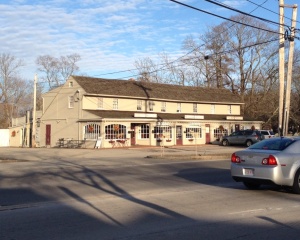Summing Up the Evidence on the Marshfield Tea Burning
I found no contemporaneous or first-person account. The earliest description appeared in an 1854, and more details dribbled out over the next century and beyond, based on either family lore or no stated authority at all.
Hazy as that local tradition is, I nonetheless believe that people in Marshfield did burn tea in the wake of the Boston Tea Party.
The 1854 story echoes what happened in other Massachusetts communities, such as Salem, Lexington, and Newburyport.
First, the community agreed unofficially not to drink or sell tea to show their opposition to the Tea Act (not because the retail price of tea was too high). Local Whig leaders confiscated that form of property from shops and locked it up. Then something spurred younger, more radical Whigs to take the tea and make a show of burning it.
The 1854 report said Nehemiah Thomas confiscated the tea, and contemporaneous documents show he was indeed the town’s senior Whig, clerk, treasurer, and deacon. But that report also said he wasn’t in town for the burning.
Instead, late in the nineteenth century authors attached two brothers-in-law to the story: Jeremiah Low, who would have descendants in Marshfield, and Benjamin White, also documented as a Whig activist in this period. Plus other, unnamed citizens.
In the twentieth century local historians pointed to a very old building as one of the places the tea was stored. That’s plausible; in the 1770s the building was an ordinary, or tavern, and towns did use public houses for public business. That said, there might have been appeal in linking this rare surviving building to a historic event, providing a focus for commemoration. So I’m a little less convinced about that claim.
I’m still left puzzling about some details of this event, however. Here are my unanswered questions.
A. Starting with a history of the White family in 1895, authors describe Marshfield’s Tea Rock as “flat on ye top,” “flatt on ye top,” and “upon a stone quite flat on top”—all of those phrases within quotation marks. That implies they were quoting from a source. But none of those authors explains where those words come from, and a Google Books search turns up nothing. Is there a missing source?
B. In 1929 the Boston Herald said that after setting fire to the tea Jeremiah Low “was later forced to flee to New York with his family.” While not making an explicit connection, that article and local authors who repeated the information implied that the Lows had to leave town because of their Whig activity.
Whoever wrote that article certainly got some information from Low’s descendants. The reporter also wrote that “a fourth generation descendant of Jeremiah” was Seth Low [1850–1916], president of Columbia University and a reform mayor of New York.
However, L. E. Fredman’s article on Mayor Low in the Journal of American Studies in 1972 and online genealogies say the man was descended from a Low family in Ipswich and Salem, not Marshfield.
Furthermore, for most of the decade after 1773 Marshfield was a safe place for Whigs while New York was where Loyalists found refuge. So what was the real basis of this family lore? What had been lost or added?
C. What was the source for Cynthia Hagar Krusell’s statement in Of Tea and Tories (1976) that the Marshfield tea-burning occurred on the night of 19 Dec 1773? Was that just the first Sunday after the Boston Tea Party? If the event occurred when Nehemiah Thomas was out of town on some legislative business, as late-1800s sources suggest, that would have been late 1774 or afterward.








